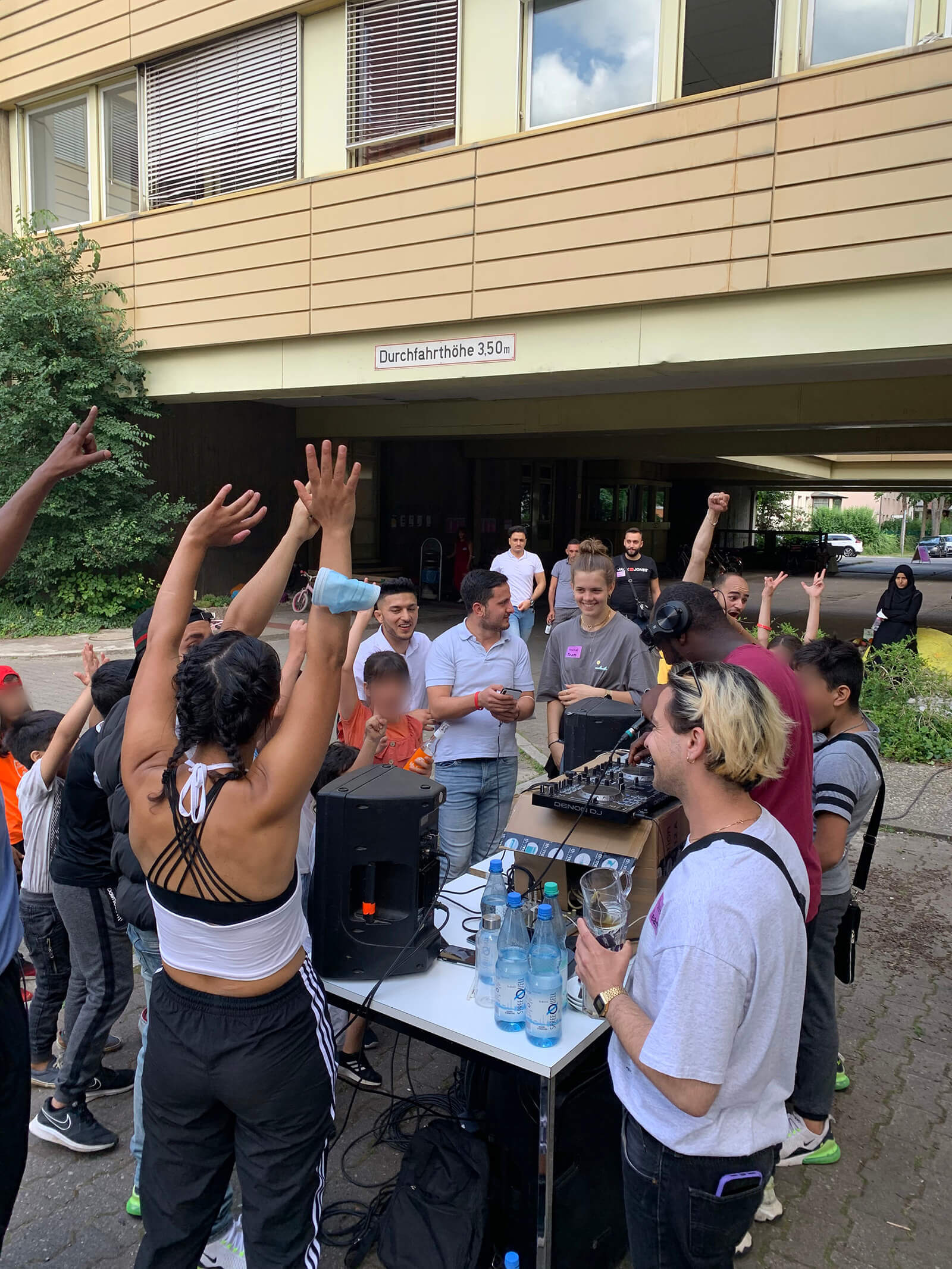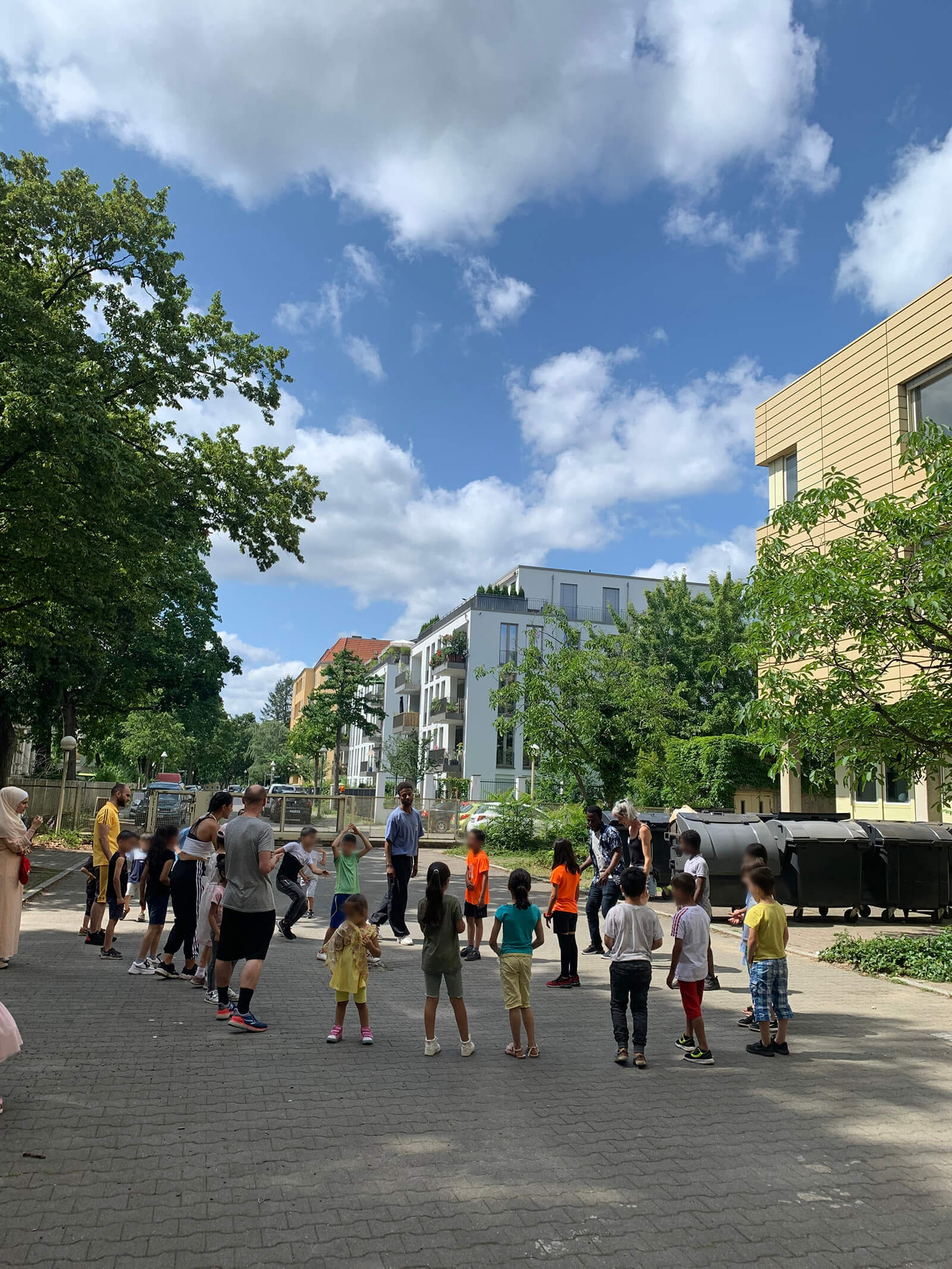The pilot project “Mobiler Tanzsaal” began testing a decentrally organized system of dance education and outreach projects in the districts of Marzahn-Hellersdorf and Charlottenburg (Westend) in summer 2021. Sixteen different dance and discussion formats were carried out in cooperation with the partner venues Campus Esche, Stadtwerk mrzn/S27 and ngbk Hellersdorf, with a total of over 400 participants spanning all age groups.
The project is both a fact-finding activity for the conception phase of the steering group and a research project, which is divided into four components:
- needs analysis
- implementation of various workshops
- continuation discussions with the partners
- project documentation and scholarly analysis
Urban practice on the outskirts of the city?
With a focus on cultural participation, the “Mobiler Tanzsaal” critically examined the concept of centrality: How can urban expansion be designed socially, ecologically and culturally, and what role can culture play in this process? The project has set itself the task of establishing contact with the residents of the neighbourhood through the universal language of dance and creating something together with them. The needs analysis at the beginning of the project was an important prerequisite for this – not only so as to create something new, but also to support what is already there. The focus was on the question: What do local people need? Who are the key stakeholders and educators on the ground? What spaces are available and how are they used? The project was jointly conceived and implemented through practice, trial and error, in workshops and in personal discussions with local stakeholders.

Artistic interventions and pop-up workshops
In artistic interventions in public space and intergenerational pop-up workshops, the participants themselves became designers of a mobile and dancing city. Current creative practices from the field of urban dance, cross-over techniques and the fusion of different dance styles formed the focus of the workshops, which were led by dance professionals with intercultural backgrounds. A non-hierarchical notion of community and a focus on co-creation with the participants was fundamental to the approach of the entire project team.
Documentation and outlook
The “Mobiler Tanzsaal” was analysed and documented by Elisa Ricci using approaches from dance studies, ethnography, and curatorial practice. Ricci’s work serves to critically interrogate the notion of decentralization as a principle of action, as well as to establish the field of dance education and community engagement as a field of research.
The project has created a broad understanding of the necessary skills in the team and of the necessity of sustainable working methods when it comes to working with urban communities. Newly developed collaborations in the field of cultural education as well as important connections with municipal authorities and programmes must now be further explored and expanded during the pilot phase “Access Point Tanz”. Moving forward, the participating funding bodies are to be included structurally and in the long term in decentralized dance education and outreach work.
The “Mobiler Tanzsaal” has shown how important it is, especially on the outskirts of the city, to work with existing locations, to connect communities with each other and to enable ongoing working models. An intercultural approach, as well as working across generations and styles, are elementary building blocks for facilitating access and establishing diversity-focussed and non-discriminatory perspectives as a foundational set of principles through dance education.

Team
Project management: Sven Seeger
Co-direction: Janne Gregor and Gabriele Reuter; Urban Culture: Joy Alpuerto-Ritter
Support management team and website: Elena Basteri
Production and dramaturgy: Veronika Wagner
Assistance project management: Verena Weiss
Research/Documentation: Elisa Ricci
Workshop facilitators: Joy Alpuerto-Ritter, Nora Amin, Thomster, Osman Osman, Fidan Sirin, Hamza Alwaz, Viola Barner, Anatol Wendler, Allahham Anas, Zafar Arab, Ali Emani, Sven Seeger, Zubair Amini
DJs: Prince Ofori, Kanishka Sarkar
Multipliers: Afsaneh Hatefi, Saman, Lisa Schwalb, Zeljko Ristic, Susan Aziz, Sabine Wolf, Tina Hans Jürgens
Cooperation partners:
Campus Esche, Wasserwerk / Berlin Mondiale, station urbaner Kulturen / nGbK Hellersdorf, More Than Shelters e.V., Pilot-Stadtwerk Marzahn / S27, Haus der Statistik.
Participating institutions:
Westend (partner: Campus Esche):
Kirschenallee initial reception centre; Prisod – Eschenallee shared accommodation; Ulme 35 e.V.; Ulmeneck senior citizens’ facility, Kastanienallee family centre.
Hellersdorf (partner: NgbK):
Eastend Hellersdorf, Stadtteilkoordination Hellersdorf.
Marzahn (partner: Pilot-Stadtwerk Marzahn / S27):
Shared accommodation for refugees EJF – Evangelisches Jugend- und Fürsorgewerk, district coordination in the neighbourhood centre DRK, Haus der Begegnung M3 e.V.
The project “Mobile Dance Hall” was realised with funds from Berliner Projektfonds Urbane Praxis. The project was part of the initiative DRAUSSENSTADT, funded by the Senate Department for Culture and Europe.